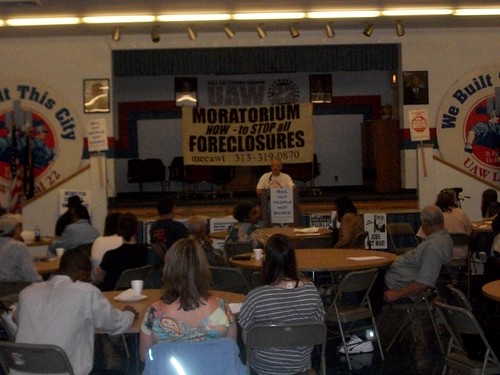
Participants at the Moratorium NOW! Coalition conference on "How the Banks Destroyed Detroit." The event was held on June 11, 2011 at UAW Local 22. (Photo: Abayomi Azikiwe), a photo by Pan-African News Wire File Photos on Flickr.
www.chicagotribune.com/business/ct-biz-0108-mortgage-fixes-20130108,0,649628.story
Federal regulators prepare new mortgage rules while cleaning up faulty foreclosure issues
$8.5B settlement includes cash payments, loan modifications to eligible borrowers
By Mary Ellen Podmolik, Chicago Tribune reporter
January 8, 2013
Six years after the housing bubble burst, federal regulators are trying to restore confidence in the nation's mortgage industry while continuing to remedy past ills.
On Monday, the Office of the Comptroller of the Currency announced an $8.5 billion settlement that will end reviews of individual foreclosed mortgages and offer cash payments and loan modifications to eligible borrowers.
And before Jan. 21, possibly as early as Thursday, the Consumer Financial Protection Bureau will finalize new mortgage lending rules mandated by the July 2010 Dodd-Frank Wall Street Reform and Consumer Protection Act.
Assisting distressed homeowners, making the mortgage process more transparent, and improving the likelihood that a borrower can repay a mortgage could nudge along a national housing market that is in the early stages of a modest recovery.
But at the same time, the expectation of more restrictive lending rules, and higher down payments, may price some consumers out of homeownership.
Depending on the rules, "it could go either way," said Svenja Gudell, a senior economist at Zillow. "Anything that helps bring transparency and understanding to the process is a good thing. Anything that overcomplicates the process is bad."
Much of the anticipated lending rules are expected to center on defining a borrower's reasonable ability to repay a mortgage, their dealings with financial institutions, and protecting lenders from lawsuits by foreclosed borrowers who claim they shouldn't have received a mortgage.
"There are a lot of things that are holding back lending," said Gene Amromin, a senior economist at the Federal Reserve Bank of Chicago. "Uncertainty about legal liability is a big one."
Well-defined, specific underwriting rules, involving greater down payments, ample documentation and specific debt-to-income ratios, aren't necessarily viewed as a bad thing, because they would lessen the chances of unaffordable mortgages being written.
Some groups, like the National Consumer Law Center, worry that the mortgage loan origination rules still will be too weak and will lead to unaffordable loans. Others worry that lending is already difficult enough, and specified that rules will only institutionalize the current tough underwriting environment.
In November, the average FICO credit score for approved first mortgages was 750, according to Ellie Mae. It was 741 in August 2011. In comparison, 84 percent of all single-family mortgages acquired by Fannie Mae and Freddie Mac from 2001 to 2008 were made to borrowers with FICO scores above 660.
"It's taken so long for the rules to go into effect since Dodd-Frank was adopted that consumers are likely to see as much negative as positive from the new rules," said Guy Cecala, president and CEO of Inside Mortgage Finance, a trade publication. "Qualified mortgages make sense on paper. In practice, what it means is coming up with a regulatory standard of what a 'safe' mortgage is."
While regulators work on making the mortgage market safer, they continue to try and aid borrowers hurt by the industry's excesses.
Monday's settlement worked out by the comptroller group, the Federal Reserve Board and 10 mortgage servicers ends independent reviews of individual mortgage foreclosures that quickly grew complicated and cumbersome. The process, which began in late 2011, required borrowers who were foreclosed upon in 2009 and 2010 and believed they were financially harmed from servicer errors to ask for a formal paperwork review.
About 4.4 million borrowers were sent information about the reviews. Fewer than 323,000 borrowers requested them.
Under the agreement, the review process will end, and 3.8 million eligible borrowers whose homes were in foreclosure in 2009 and 2010 will share $3.3 billion, regardless of whether they asked for a formal review. The cash payments will range from several hundred dollars to as much as $125,000, and recipients will be notified before April 1. Other forms of assistance, including loan modifications, will total $5.2 billion.
"I think they're definitely trying to put this in the rearview mirror and look ahead, but it's not the same as solving the problem," said Diane Thompson, of counsel at the National Consumer Law Center. "I don't think we've begun to address what's happened before. Foreclosures remain at historically high levels."
Participating servicers in the agreement were Aurora, Bank of America, Citibank, JPMorgan Chase, MetLife Bank, PNC, Sovereign, SunTrust, U.S. Bank and Wells Fargo.
That pact is separate from the $25 billion settlement reached in February between the Justice Department, state attorneys general and the five largest mortgage services. Negotiations with additional servicers to join that pact continue, according to a spokeswoman for the Illinois Attorney General's office.
"I think everybody is trying to look forward," said Ed Jacob, executive director at Neighborhood Housing Services of Chicago Inc. "Everybody has fatigue."
mepodmolik@tribune.com
Twitter @mepodmolik
Mortgage timeline
Here are some recent government responses to the mortgage crisis:
Monday: $8.5 billion settlement for borrowers announced between Office of the Comptroller of the Currency, Federal Reserve and 10 mortgage servicers.
October: Department of Justice accuses Countrywide Financial and Bank of America of causing $1 billion in losses to taxpayers (separate from another settlement with Bank of America reached Monday).
October: Financial fraud task force, announced by President Barack Obama earlier in year, alleges fraud in mortgage-backed securities sold by Bear Stearns.
July: Justice Department announces $175 million-plus settlement with Wells Fargo to compensate tens of thousands of black and Hispanic borrowers who were allegedly steered into high-cost mortgages.
February: Settlement reached between Justice Department, state attorneys general and five biggest mortgage servicers to provide $25 billion in relief for homeowners.
No comments:
Post a Comment